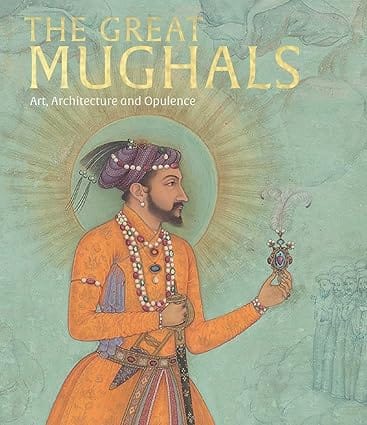WELCOME TO MIDLAND BOOK SHOP!
SHOP FOR
- Contemporary Fiction
- Contemporary Fiction
- Children
- Children
- Comics & Graphic Novels
- Comics & Graphic Novels
- Non-Fiction
- Non-Fiction
- Fiction
- Fiction
Shop No.20, Aurobindo Palace Market, Hauz Khas, Near Church +91 9818282497 | 011 26867121 110016 New Delhi IN
Midland The Book Shop ™
Shop No.20, Aurobindo Palace Market, Hauz Khas, Near Church +91 9818282497 | 011 26867121 New Delhi, IN
+919871604786 https://www.midlandbookshop.com/s/607fe93d7eafcac1f2c73ea4/676a925de6f825019b0470ed/instagram-post-3--480x480.jpeg" [email protected]9781838510367 673740d107a5050036a42d3b The Great Mughals Art, Architecture And Opulence https://www.midlandbookshop.com/s/607fe93d7eafcac1f2c73ea4/673740d307a5050036a42d43/71cy7fd-avl-_sy425_.jpg 9781838510367
Showcases some of the most stunning treasures from the dynasty that created the Taj Mahal The Great Mughals presents, for the first time, the opulent, internationalist culture of Mughal Hindustan in the age of its greatest emperors: Akbar (r. 1556–1605), Jahangir (r. 1605–27) and Shah Jahan (r. 1628–58). Providing a compelling new narrative to describe the origins of Mughal art, it explores how a huge Iranian influence permeated the sophisticated craft traditions of the Indian subcontinent to create a distinctively Mughal court are included, from contemporary portraits to jeweled gold vessels and carpets. In chapters that conjure the unique dynamics of each reign, essays with historical sweep combine with texts focused on important objects to tell unexpected stories about a dynasty perhaps best known for commissioning the Taj Mahal.
Review
From the ramparts of the Agra fort, the Mughal Emperors once ruled over the greatest and most populous of all Muslim Empires. The Mughals claimed the loyalty of some 100 million subjects- five times the number of those ruled by their Ottoman rivals, and many times that ruled by their westerly neighbours, the Safavids of Isfahan. Perhaps more than any other Islamic dynasty, the Mughals made their love of architecture and the arts a central part of their identity as rulers, believing that artists and architects were, in the words of the Emperor Humayun, "the delight of all the world.” In this magnificent catalogue of her astonishing V&A show, Susan Stronge brings together a beautifully curated treasury of the greatest wonders to survive from one of the most elegant and refined courts in world history. Mixing the art of Timurid Central Asia with that of Hindu Rajasthan and cross fertilising both of these with new ideas brought from Jesuit Portugal and Jacobean London, the Mughals created an entirely new aesthetic. Their kharkhanas and khazanas became a new world of artistic expression marked by unprecedented experimentation in miniature painting and ivory and jade carving, a world of silken hangings and coats of gilded and inscribed Mughal armour. Here can be found teak furniture inlaid with mother of pearl, emerald-set daggers and diamond-studded scabbards, jade drinking cups in the form of antelope beside balustrades of Makrana marble studded with gleaming semi-precious stones the colour of pigeon’s blood, yellow topaz and lizard-green gems. This, truly, is the art of a golden age. William Dalrymple, 2nd July 2024
About the Author
Susan Stronge is senior curator, Asia Department, V&A.
out of stock INR 3996
1 1
Email ID already exists!
Your Current password is incorrect
Password Updated Successfully
Thanks for your Feedback
- Home
- Coffee Table Books
- The Great Mughals Art, Architecture And Opulence
The Great Mughals Art, Architecture And Opulence
ISBN: 9781838510367
₹3,996
₹4,995 (20% OFF)SIZE GUIDE
Back In Stock Shortly
Sold By: Hauz Khas - Aurobindo Market
Details
- ISBN: 9781838510367
- Author: Susan Stronge
- Publisher: V&a
- Pages: 340
- Format: Hardback
Book Description
Showcases some of the most stunning treasures from the dynasty that created the Taj Mahal The Great Mughals presents, for the first time, the opulent, internationalist culture of Mughal Hindustan in the age of its greatest emperors: Akbar (r. 1556–1605), Jahangir (r. 1605–27) and Shah Jahan (r. 1628–58). Providing a compelling new narrative to describe the origins of Mughal art, it explores how a huge Iranian influence permeated the sophisticated craft traditions of the Indian subcontinent to create a distinctively Mughal court are included, from contemporary portraits to jeweled gold vessels and carpets. In chapters that conjure the unique dynamics of each reign, essays with historical sweep combine with texts focused on important objects to tell unexpected stories about a dynasty perhaps best known for commissioning the Taj Mahal.
Review
From the ramparts of the Agra fort, the Mughal Emperors once ruled over the greatest and most populous of all Muslim Empires. The Mughals claimed the loyalty of some 100 million subjects- five times the number of those ruled by their Ottoman rivals, and many times that ruled by their westerly neighbours, the Safavids of Isfahan. Perhaps more than any other Islamic dynasty, the Mughals made their love of architecture and the arts a central part of their identity as rulers, believing that artists and architects were, in the words of the Emperor Humayun, "the delight of all the world.” In this magnificent catalogue of her astonishing V&A show, Susan Stronge brings together a beautifully curated treasury of the greatest wonders to survive from one of the most elegant and refined courts in world history. Mixing the art of Timurid Central Asia with that of Hindu Rajasthan and cross fertilising both of these with new ideas brought from Jesuit Portugal and Jacobean London, the Mughals created an entirely new aesthetic. Their kharkhanas and khazanas became a new world of artistic expression marked by unprecedented experimentation in miniature painting and ivory and jade carving, a world of silken hangings and coats of gilded and inscribed Mughal armour. Here can be found teak furniture inlaid with mother of pearl, emerald-set daggers and diamond-studded scabbards, jade drinking cups in the form of antelope beside balustrades of Makrana marble studded with gleaming semi-precious stones the colour of pigeon’s blood, yellow topaz and lizard-green gems. This, truly, is the art of a golden age. William Dalrymple, 2nd July 2024
About the Author
Susan Stronge is senior curator, Asia Department, V&A.
User reviews
NEWSLETTER
Subscribe to get Email Updates!
Thanks for subscribing.
Your response has been recorded.

India's Iconic & Independent Book Store offering a vast selection of books across a variety of genres Since 1978.
"We Believe In The Power of Books" Our mission is to make books accessible to everyone, and to cultivate a culture of reading and learning. We strive to provide a wide range of books, from classic literature, sci-fi and fantasy, to graphic novels, biographies and self-help books, so that everyone can find something to read.
Whether you’re looking for your next great read, a gift for someone special, or just browsing, Midland is here to make your book-buying experience easy and enjoyable.
We are shipping pan India and across the world.
For Bulk Order / Corporate Gifting
 +91 9818282497 |
+91 9818282497 |  [email protected]
[email protected]
Click To Know More
INFORMATION
ACCOUNT
QUICK LINKS
ADDRESS
Midland Book Shop - Hauz Khas
Shop No.20, Aurobindo Palace Market, Near Church, New Delhi
Shop No.20, Aurobindo Palace Market, Near Church, New Delhi














